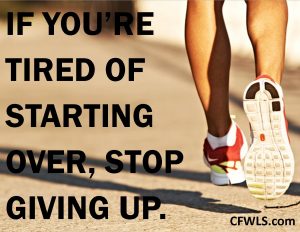 You’ve regained some weight. It happens. What are you going to do about it?
You’ve regained some weight. It happens. What are you going to do about it?
First, lets talk about the reasons for re-gaining weight and recognizing some of this back-sliding. Take charge of your thinking. We’ll talk a little about self-management skills and some tips to get you back on track and lead you to success. picked up a very good book recently. It’s written by a psychologist who’s very attuned to this problem. She’s written previous books. She wrote The Beck Diet Solution. Her name is Judith Beck. I would encourage anyone who is struggling with weight to read it. It’s not a diet book but how you actually change your behavior towards eating. She and her daughter took it one step further. They put together the next step in all this called The Diet Trap Solution. It looks at different behavior traps and mindsets that we fall into and what do you do about it. Very good book. I haven’t quite completed it yet. I might take some of those ideas and put them into a talk like this.
What are the typical reasons for regaining weight? The biggest reasons are shifting your calories to more carbohydrates and not exercising. I hear so often that a patient is doing so well and then they drift off on the exercise. I preach on this over and over again. Keep that carbohydrate ratcheted down. Everyone has a carbohydrate tipping point. When you get above that tipping point you will struggle. For those people who have a really high tipping point, they’re probably not struggling. For those of us who have a low tipping point, we shift and we struggle. Count your carbohydrates!
There are other things that tend to affect this. Lack of sleep increases stress which leads to eating more comfort foods. Lots of things occur when we don’t get good quality sleep. Sleep is the way we recover. We get worn out during a day. We need to recover. If we don’t get good quality sleep we never actually recover. Stress hormones don’t go down. Increased stress causes an increase in cortisol. You become leptin resistant. It’s a hormone made by your fatty tissue. It makes you feel satisfied when you eat something. Therefore, we increase comfort foods again which causes increased fat storage. Certain medications can cause weight gain. The biggest culprits are the psych meds like anti-depressants. The only exception I’m aware of is Wellbutrin. It has a chemical appearance similar to some of the appetite suppressants. For some people, Wellbutrin helps them lose weight. A lot of the blood pressure meds and most diabetic meds cause weight gain. Depo Provera causes weight gain. I don’t think I’ve ever seen anyone not gain weight. I would encourage you to use a different birth control. Medical conditions such as thyroid problems can cause weight gain. The thyroid regulates your overall metabolism. Menopause obviously affects half the population. Aging is also a culprit. As we age, some of the hormone levels go down, specifically testosterone. Estradiol levels go down with menopause. Estradiol and testosterone both help you preserve lean body mass which keeps metabolism higher. As estradiol levels go down during menopause, estrone levels go up and cause fat storage. It gets easier to gain weight as you go through menopause. There are things we can do to combat that.
 Many times we gain weight back because we start going back to old behaviors. Almost all relapses occur within 90 days. It occurs fairly early. Sometimes during that 6-9 month period we really see people starting to struggle again because the old behaviors start sneaking back in. New behaviors have to become a habit. Backsliding occurs when you overeat any food after a lapse. This is often triggered by an event or situation (stressful relationship, social influences, etc.). Once we start doing this we drift back to our old behavior. You need to use coping responses to combat the relapses. The following helps: positive self-talk, exercise, meditation, deep breathing, and discussions with supporters. You want to have these coping mechanisms in place because these backsliding situations will always develop. It can be a positive situation or negative that causes the backsliding. Sometimes this happens when we start categorizing food. I’m not a big fan of diet depravation. The exception is that if there is truly a trigger food that sets off your eating (you can’t eat just one potato chip-you eat the whole bag) then you need to stay away from it. That’s something you have to figure out yourself. But for most foods I don’t like to categorize them as “bad.” If we treat things as truly bad, it creates tension which leads to obsession. It’s really working on portion control. If others are telling you that you can’t have certain foods, it often leads to rebelling.
Many times we gain weight back because we start going back to old behaviors. Almost all relapses occur within 90 days. It occurs fairly early. Sometimes during that 6-9 month period we really see people starting to struggle again because the old behaviors start sneaking back in. New behaviors have to become a habit. Backsliding occurs when you overeat any food after a lapse. This is often triggered by an event or situation (stressful relationship, social influences, etc.). Once we start doing this we drift back to our old behavior. You need to use coping responses to combat the relapses. The following helps: positive self-talk, exercise, meditation, deep breathing, and discussions with supporters. You want to have these coping mechanisms in place because these backsliding situations will always develop. It can be a positive situation or negative that causes the backsliding. Sometimes this happens when we start categorizing food. I’m not a big fan of diet depravation. The exception is that if there is truly a trigger food that sets off your eating (you can’t eat just one potato chip-you eat the whole bag) then you need to stay away from it. That’s something you have to figure out yourself. But for most foods I don’t like to categorize them as “bad.” If we treat things as truly bad, it creates tension which leads to obsession. It’s really working on portion control. If others are telling you that you can’t have certain foods, it often leads to rebelling.
You want to take charge of your thinking. Typically errors in thinking almost always accompany ineffective coping skills. We want to change the strategy to help take control of your thinking. Avoid the trap of perfectionism and unrealistic things. An unrealistic goal would be to be the same size you were at age 18. Use positive self-talk. Listen to yourself. What are you saying? Are you making excuses?
Are you making rationalizations? You want to challenge yourself, but you also want to be reasonable with yourself. Challenge yourself to commit to your goals. Learn to make better decisions. Don’t let your emotions cloud those decisions. We are emotional animals. We let emotions take control and that never works.
Develop self-management skills. Learn how to identify and change behavior patterns. Self-management tools include learning to: communicate effectively (be open and honest), problem solving (assess, plan, take action), self-monitor (track coping skills), mange conflict (handle relationships effectively(, cope with emotions (recognize healthy/unhealthy feelings), avoid thinking traps (challenge irrational beliefs), manage stress effectively (meditation, exercise), and mange time (“to do “ list, et priorities, follow a plan). There’s never enough time so we have to prioritize things.
Tips to help get you back on track. First, don’t beat yourself up. We all backslide. Try to figure out what event triggered a relapse and learn from it. Second, be patient. Creating new habits takes time. It’s something we have to work on over and over. Third, think outside the box. If you’re doing something that’s not working for you, it’s time to change what you’re doing. By doing the same things you’ve always done, you’ll get the same result. Those are one of the definitions of insanity-doing the same thing over and over again and think we’re going to get a different result. Take a different approach. If you’re struggling and have questions, talk to one of the counselors here at The Center for Weight Loss Success. We have multiple programs here. I’m not a counselor. I’ll tell you what you need to do. A big part of it is how you make that happen in your life. Sometimes sitting down with one of the counselors and figuring out what you’re struggling with and what the solutions are can be a big help. How can I change this? Change is hard!
Tips to re-start! Try one of the “Jump Start/Quick Start” 2 week programs at CFWLS. It simplifies things using some of the shakes. It’s a simple thing to do. You have to translate that eventually into long-term. If you’re struggling and you’re going to do just one thing: count your carbs! You’re getting the most bang for your buck right there. Even when we think we’re doing well, we drift. If you’re going to do two things: count your protein! It’s easy to count. You want to make sure you haven’t drifted on that too. If you’re going to do three things: count your exercise! Write it down! If you don’t how we are going to know what was really wrong? We may think we’re doing everything right. But if you don’t write it down, we’ll never really know that. Typically writing it down will change your behavior. So simple things but not necessarily easy.
Tips for success! Arm yourself with knowledge. Use the info through the programs and staff at CFWLS to help you recognize backsliding and take the steps to stop it in its tracks. Go back and review the information. Acknowledge and celebrate when you take control of that first slip. Realize that we’re not going to be perfect. Keep supportive people around you. Recruit people to help you. The staff at CFWLS is always ready to help.
I mentioned we have the “Back on Track After Weight Loss Surgery.” We also have the whole digital program as well. You do it yourself. There are PDF’s you can download and print. There are a lot of things that go along with it.
If there are questions give us a yell here at CFWLS. You can email us at [email protected]
The phone number is 757-873-1880. Stop by and get your body composition analysis done. You should be receiving the recipes and weekly weight loss tips. Tune in to Losing Weight USA each Tuesday at 6:00pm for the next webinar. Remember it’s your life. Make it a healthy one!






 Cat Keller has a wealth of experience in marketing, e-marketing, advertising and customer service and manages our Weight Loss Nutritional Store. She is always planning something fun and exciting. special events, discounts, giveaways – it’s never a dull moment. She is happy to help you with questions you may have regarding our products or services. Cat is a graduate of William & Mary, where she studied Government/Pre-Law and minored in Marketing.
Cat Keller has a wealth of experience in marketing, e-marketing, advertising and customer service and manages our Weight Loss Nutritional Store. She is always planning something fun and exciting. special events, discounts, giveaways – it’s never a dull moment. She is happy to help you with questions you may have regarding our products or services. Cat is a graduate of William & Mary, where she studied Government/Pre-Law and minored in Marketing.